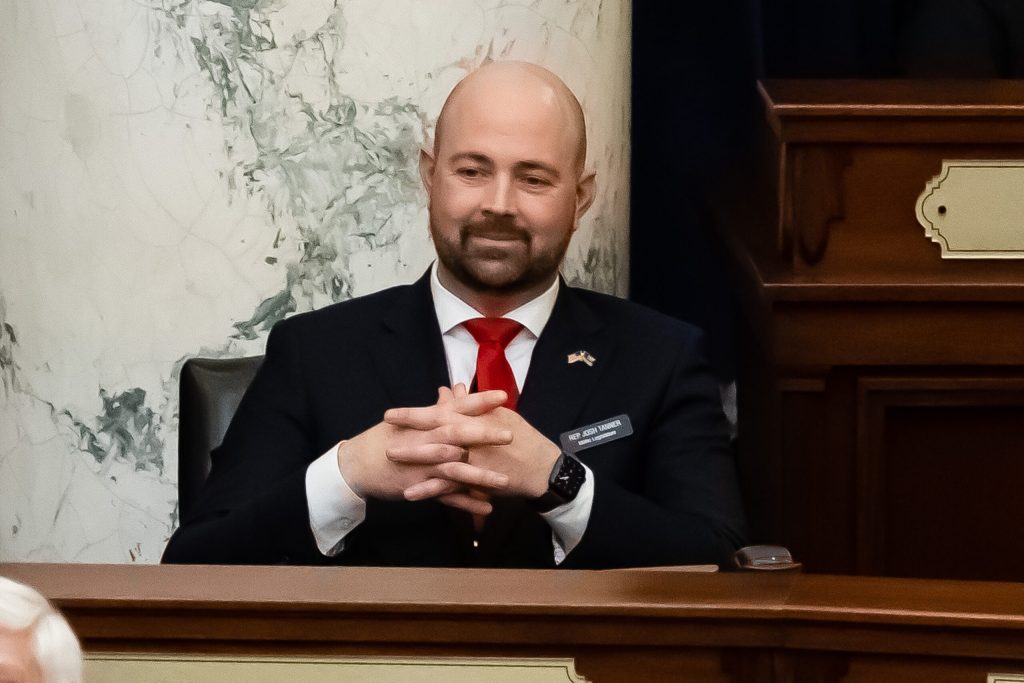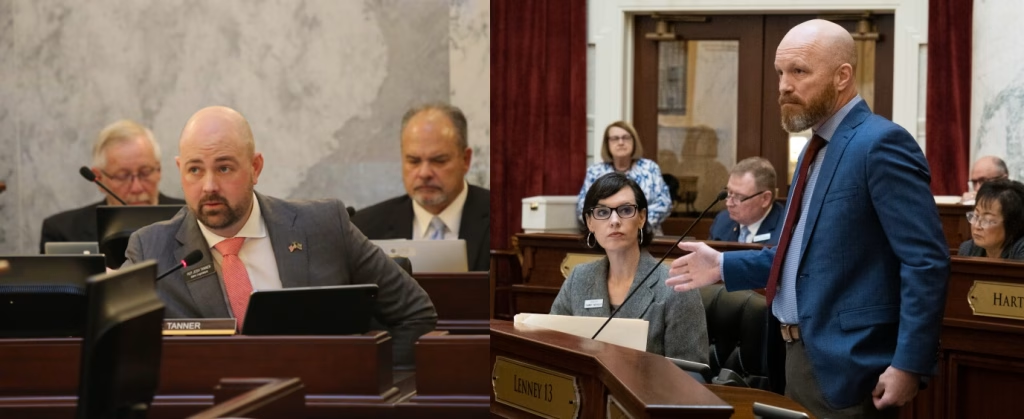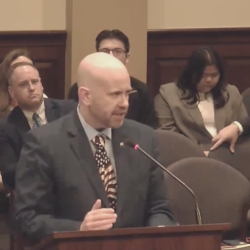By Sarah Lurie | Originally published at 5b Gazette
A local election dispute in Ketchum has exposed a rift in Idaho’s legal framework, pitting tax codes against election statutes in a battle over what it means to call a place home.
At the center is Pete Prekeges, a 20-year owner of Grumpy’s, a beloved Ketchum bar known for its no-frills vibe and loyal patrons.
As the Gazette previously reported, Prekeges, who leased a residence in Ketchum in January 2025 and derives his income from the business, found himself disqualified from the mayoral ballot in mid-September by Blaine County Clerk Stephen Graham over a homestead exemption tied to his former home in nearby Hailey.
The case, heard in a standing room only courtroom on Sept. 22, culminated in a swift ruling by District Judge Reed Cotten that reinstated Prekeges, highlighting tensions between state uniformity in elections and the nuances of municipal governance.
But beneath the surface, it raises broader questions about administrative lags in tax systems, mid-year moves, and the potential for disenfranchisement in a state where property ownership often intersects with civic participation.
The saga began innocuously enough. Prekeges, seeking to challenge the incumbent in Ketchum’s November 2025 election, filed his candidacy declaration on Aug. 20, disclosing a homestead exemption on his Hailey property—a tax break that reduces assessed value by up to $125,000 for primary residences under Idaho Code.
The Ketchum city clerk certified him, deeming him a qualified elector under municipal laws.
Yet, on Sept. 15, Graham notified Prekeges of his removal, citing Idaho Code Section 34-107(2), which mandates that a claimed homestead “shall be the person’s residence for voting purposes.”
This left Prekeges as the sole challenger off the ballot, prompting an emergency petition to the district court just days before absentee ballots were set to print on Sept. 25.
Anne Haws, Prekeges’s attorney, framed the removal as a misapplication of law that threatened democratic principles. In her opening argument, Haws invoked a lyrical metaphor from a 1999 Everlast song: “You know where you end up, usually depends on where you start.”
She contended that the starting point should be Idaho’s municipal election statutes under Title 50, Chapter 4, which define residency through a multi-factor test including business pursuits, employment, and leases—factors Prekeges, she argued, met handily.
“The county clerk’s interpretation would prevent any mid-year move in candidacy by anyone in the state of Idaho who has a homestead exemption on a piece of property,” Haws argued. “That doesn’t make any sense. It’s antithetical to democratic process, and it violates constitutional rights.”
She pointed to Prekeges’s attempt to remove the exemption on Aug. 27, only to learn from the assessor that mid-year changes are barred, describing it as “simply an administrative lag” rather than evidence of residency in Hailey.
Haws also highlighted out-of-state precedents where homestead exemptions were treated as non-dispositive, urging the court to avoid rendering municipal definitions “utterly meaningless.”
On the other side, Chief Deputy Prosecuting Attorney Tim Graves, representing the county, defended the clerk’s authority and interpretation, emphasizing uniformity in election administration.
Graves argued that Title 34, the general elections code, takes precedence, with the homestead provision acting as a “first hurdle” before considering broader factors. “The election law says you don’t even get to those factors unless there’s no homestead exemption on the property,” Graves told the court.
He noted Prekeges’s candid disclosure on the state-issued candidacy form, crediting him for transparency but insisting it disqualified him: “The presence of that homeowner’s exemption in Hailey makes him unqualified to run for mayor of Ketchum under Idaho law.”
Graves dismissed Title 50’s multi-factor test as secondary, reading Section 34-1401(2) as a catch-all that prioritizes Title 34 in conflicts: “Title 34 controls, even if there is a specific provision [in Title 50].”
He underscored the clerk’s broad powers under Section 34-219 to investigate and exclude unqualified candidates, even without a third-party complaint, likening the clerk to a “general referee” of elections.
The hearing, expedited amid a courtroom “full of people invested in the issue,” as Haws noted, delved into procedural minutiae.
Graves conceded the rushed nature—filed late Friday, argued Monday—but argued no further delay was needed, though he offered to provide clerk and assessor declarations if required.
Haws countered that the clerk lacked unilateral authority, suggesting he should have challenged Prekeges’s voter registration under Section 34-432 (giving 20 days to respond) or referred errors back to the city clerk under Section 34-214.
The debate spotlighted real-world implications: What of divorced couples or mid-year movers? “If we’re going to interpret the law the way that the county urges… I’m going to be disenfranchised from voting in my new place of chosen living,” Haws posited hypothetically.
Judge Cotten, presiding over the Blaine County District Court, ruled decisively for Prekeges, finding the county clerk had authority to review but erred in applying Title 34’s homestead rule to a municipal race. “My reading of Idaho Code Section 34-1401… providing a specific exemption for municipal elections saying that they need to be governed under Chapter 4, Title 50,” Cotten explained.
“And because that exemption exists… the court will find that Chapter 4, Title 50, is the statute that applies… And in that definition, it does not have that same requirement that you find in Title 34 regarding the homestead.”
He ordered Prekeges restored to the ballot, emphasizing irreparable harm if delayed: “All other factors or most of the factors remain in the petitioner’s favor.”
This decision, while resolving the immediate crisis, uncovers deeper fissures in Idaho’s statutes.
Enacted in 1993 to carve out municipal exceptions from general election laws, Title 50 aims to accommodate local contexts, yet overlaps with Title 34—amended in 2015 to tie homesteads to voting residency—create ambiguity.
Graves, meanwhile, warned of inconsistency: “If the court believes that Title 50 controls and Title 34 is irrelevant, then that’s where we are today.”
As ballots print with Prekeges’s name, the ruling may prompt legislative fixes. Indeed, with 2026 midterms looming (the county clerk’s seat is up for grabs in 2026), advocates will surely push for clearer residency guidelines.
For Ketchum voters, it’s a reminder that even in small-town politics, a constitutional skirmish is possible.
Early voting begins Oct. 14 and Election Day is Nov. 4.
Feature image by Alexandra Gold via Unsplash
About Sarah Lurie
Sarah Lurie holds master's degrees in public administration and legal studies. She is a JD candidate and publisher of the 5b Gazette.













